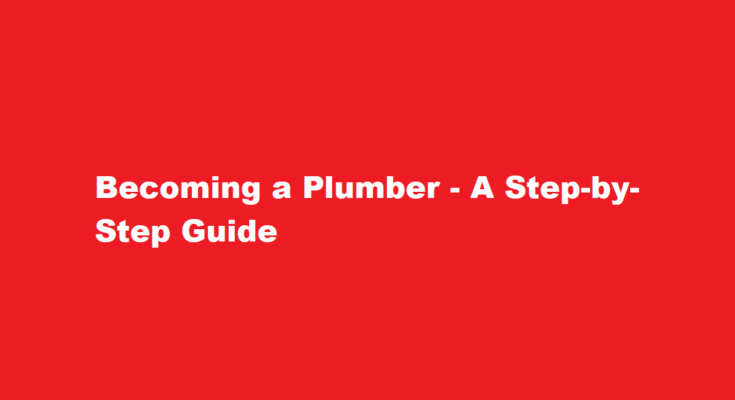Introduction
Plumbing is a vital and often underappreciated profession that plays a crucial role in ensuring the proper functioning of our homes and infrastructure. From fixing leaks to installing complex piping systems, plumbers are in constant demand. If you’re considering a career as a plumber, this article will guide you through the steps to become a skilled and successful professional in this field.
Understand the Role of a Plumber
Before embarking on a plumbing career, it’s essential to understand the responsibilities and scope of the profession. Plumbers are responsible for installing, maintaining, and repairing water supply and drainage systems. They work on a wide range of projects, from residential to commercial and industrial settings. Plumbers should have a strong foundation in mathematics, problem-solving, and practical skills to excel in this field.
High School Education and Preparation
To become a plumber, start by obtaining a high school diploma or GED. During your high school years, focus on subjects like mathematics, science, and technical education, which can help develop the essential skills you’ll need in the plumbing profession. You can also participate in vocational programs, take shop classes, or explore trade schools that offer plumbing-related coursework.
Apprenticeship Programs
One of the most common paths to becoming a plumber is through an apprenticeship program. These programs combine on-the-job training with classroom instruction. To get started, you’ll need to find an employer or a plumbing company willing to take you on as an apprentice. During your apprenticeship, you’ll work alongside experienced plumbers, learning the trade from the ground up. This hands-on experience is invaluable for gaining practical skills and industry knowledge.
Requirements and Licensing
Plumbing is a highly regulated profession, and most regions require plumbers to be licensed. The requirements for licensure vary by location but generally include completing a specific number of apprenticeship hours, passing a licensing exam, and meeting other criteria. Make sure to research the licensing requirements in your area and fulfill them to become a certified plumber.
Classroom Education
While apprenticeships provide practical training, classroom education is also essential. Many technical schools and community colleges offer plumbing courses that cover topics such as plumbing codes, safety practices, and system design. Pursuing formal education in plumbing can give you a more comprehensive understanding of the field and make you a more competitive candidate in the job market.
Gain Practical Experience
During your apprenticeship, you’ll have the opportunity to work on a variety of plumbing projects. Take advantage of this time to gain experience in different areas of plumbing, including residential, commercial, and industrial settings. The more diverse your experience, the better equipped you’ll be to handle various challenges as a plumber.
Develop Strong Communication Skills
Plumbers often work with clients and collaborate with other tradespeople on construction sites. Effective communication is crucial in this profession. Develop your ability to explain plumbing issues and solutions to clients in a clear and understandable manner. Good communication skills will enhance your customer service and ensure successful project completion.
Stay Updated on Industry Trends
The plumbing industry is continuously evolving, with new technologies and materials being introduced regularly. Stay current with industry trends and advancements by reading trade publications, attending workshops, and participating in professional organizations. This commitment to lifelong learning will help you remain competitive and adapt to changes in the field.
Specialize and Seek Certifications
Once you’ve gained experience in the plumbing industry, consider specializing in a particular area, such as gas piping, water heating systems, or green plumbing practices. Specialization can make you more marketable and open up opportunities for higher-paying jobs. Additionally, obtaining certifications in your chosen specialty can further enhance your credentials and earning potential.
Establish Your Business (Optional)
Some experienced plumbers choose to start their own plumbing businesses. This path requires not only excellent plumbing skills but also business acumen. You’ll need to handle business operations, marketing, and customer management. Starting a plumbing business can be a rewarding endeavor, but it also comes with added responsibilities and risks.
Embrace Safety Practices
Plumbers often work with hazardous materials and in potentially dangerous environments. Prioritize safety by adhering to safety regulations, wearing appropriate personal protective equipment, and following established safety protocols. A commitment to safety is crucial for your well-being and the well-being of those around you.
FREQUENTLY ASKED QUESTIONS
How can I become a plumber in India?
After completing class 10, students can choose to pursue one year-long ITI course for plumbing. Hence, it takes almost 1 year to become a plumber.
What is the salary of a plumber in India?
An Entry Level Plumber with less than three years of experience earns an average salary of ₹3.0 Lakhs per year. A mid-career Plumber with 4-9 years of experience earns an average salary of ₹3.5 Lakhs per year, while an experienced Plumber with 10-20 years of experience earns an average salary of ₹3.8 Lakhs per year.
Conclusion
Becoming a plumber is a rewarding and practical career choice, offering job security and the opportunity to contribute to the well-being of your community. By following the steps outlined in this article, you can build a successful career in plumbing. Remember to continuously improve your skills, stay informed about industry developments, and consider specialization to enhance your prospects in this essential trade. Whether you choose to work for an established plumbing company or start your own business, a career in plumbing can lead to a fulfilling and prosperous future.
Read Also : Canceling a Zelle Payment – A Step-by-Step Guide



